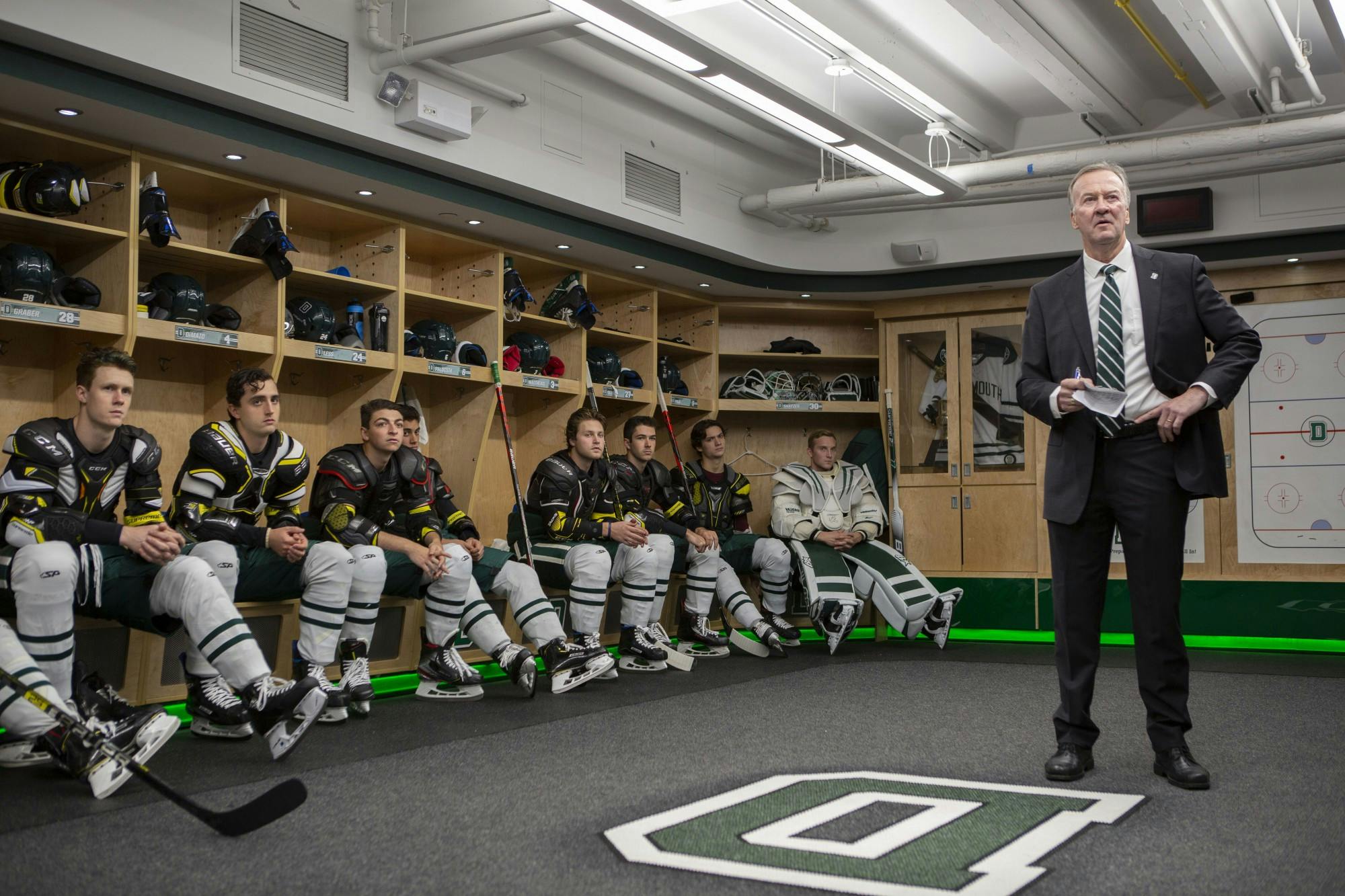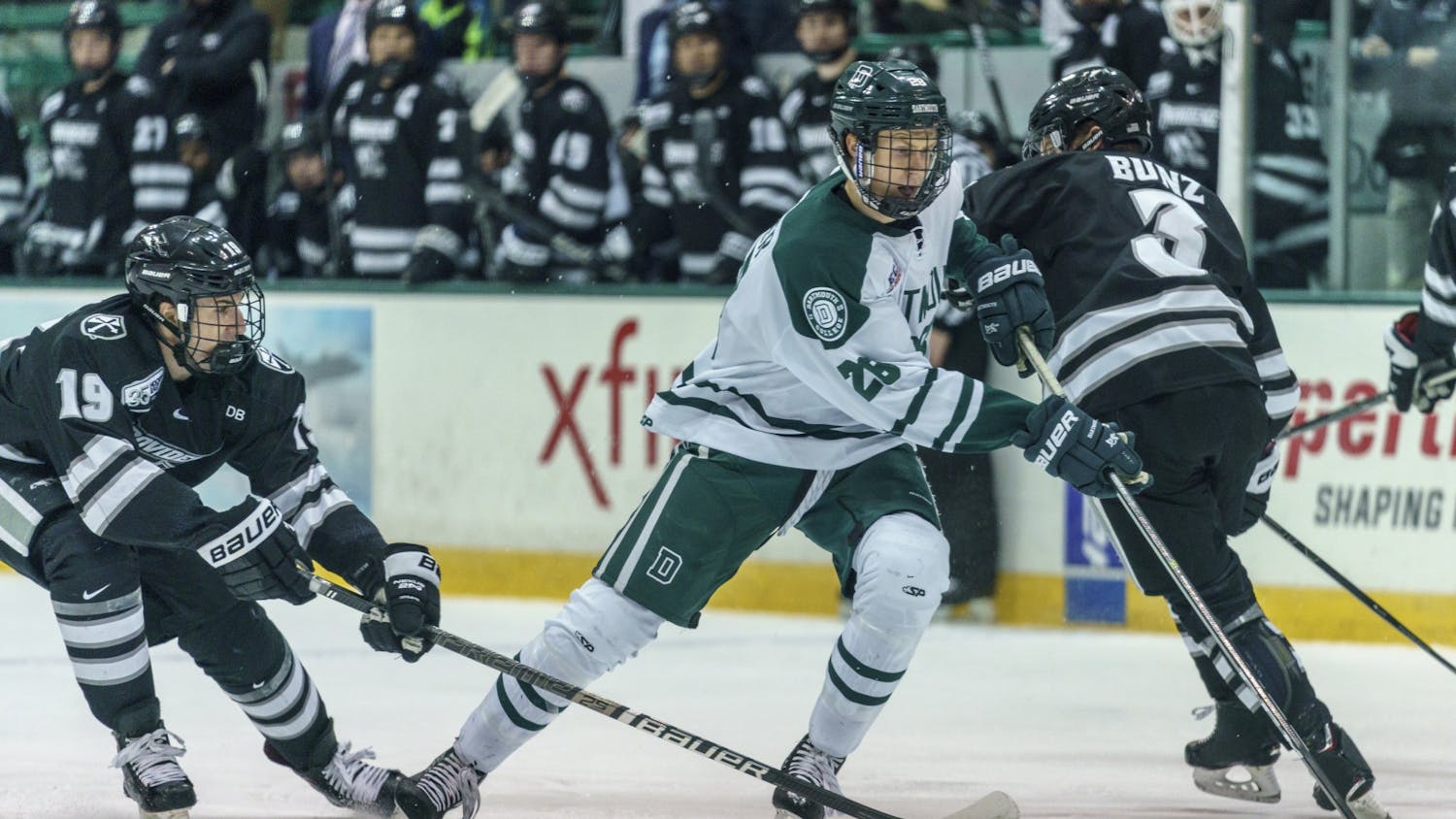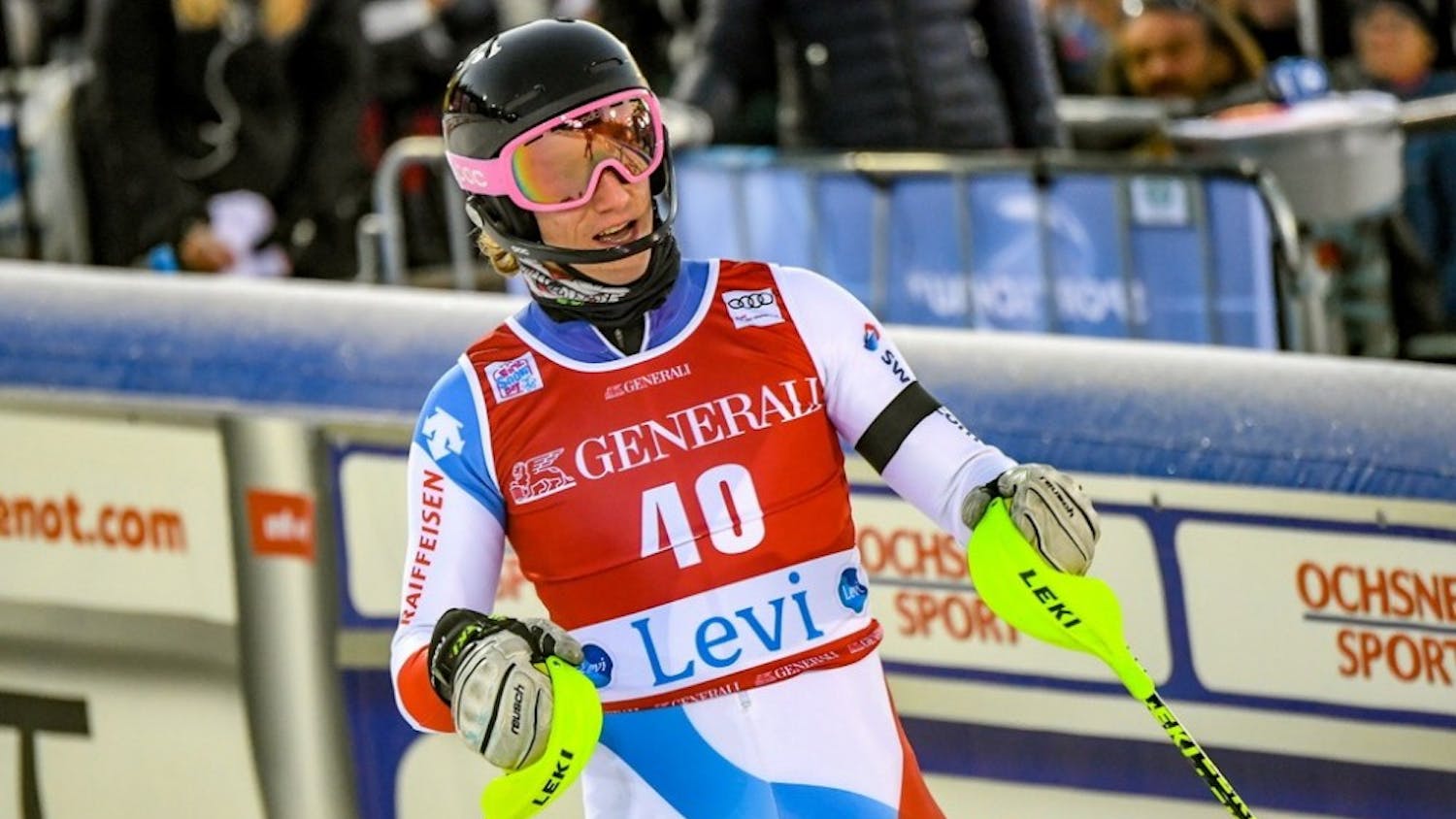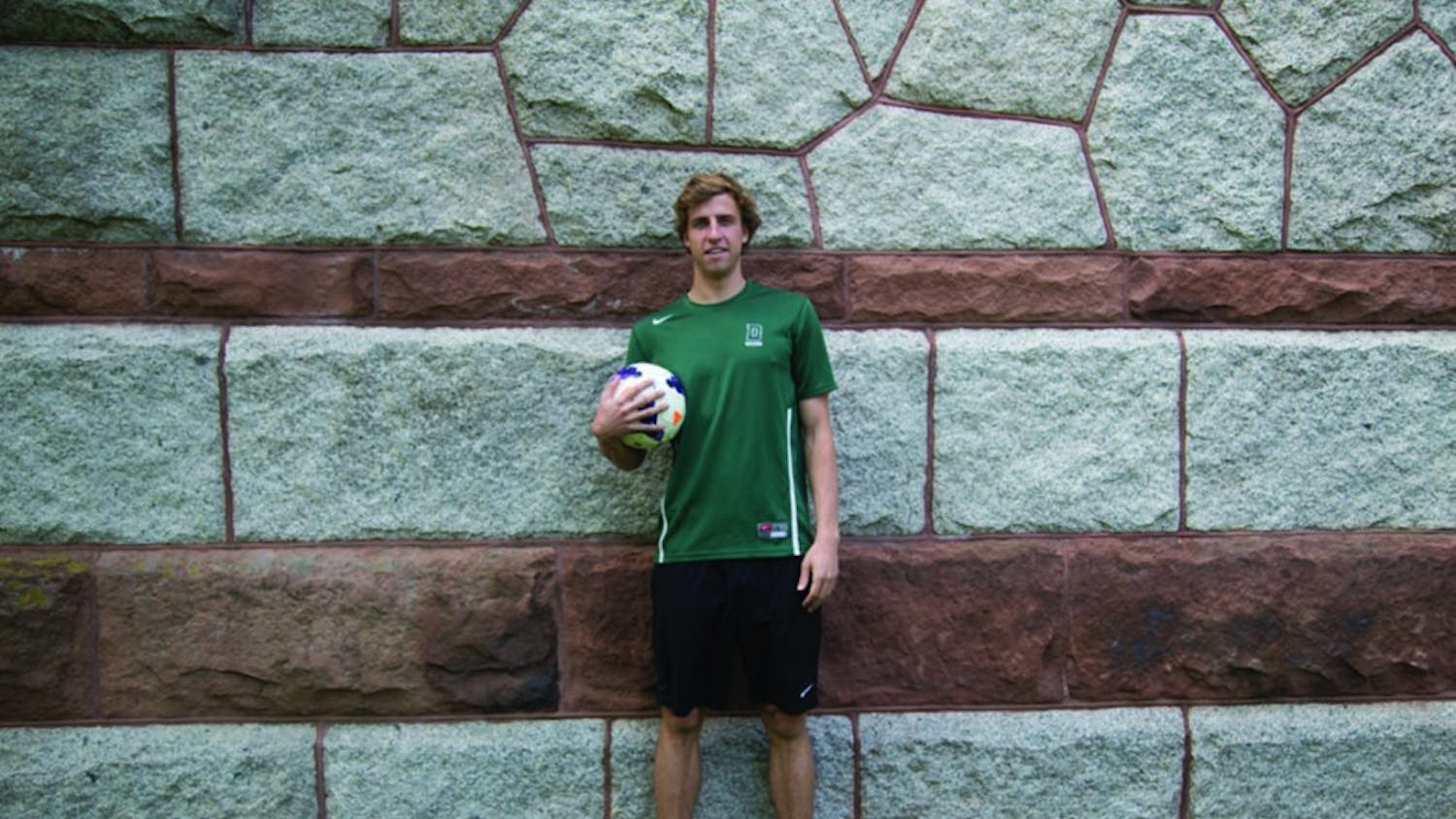Hard work, passion for the game of hockey and “big skates to fill” — according to his players and those who know him best, that is what men’s hockey head coach Bob Gaudet ’81, who announced his retirement on April 22, will leave behind.
Gaudet served as Big Green head coach for 23 years. In that time, he coached 752 games and amassed 331 wins, both school records. He earned 2005-06 Eastern College Athletic Conference Coach of the Year honors and led the team to an Ivy League championship in 2007. During the 2018-19 season, he became the all-time leader in games coached by an ECAC hockey coach.
Long before he was head coach for the Big Green, Gaudet first started playing hockey on a frozen pond just down the street from his childhood home in Saugus, Massachusetts.
“I used to go down there and just play hockey with my buddies when I was, you know, eight, nine, 10, somewhere in there,” Gaudet said. “Somehow, through one of those kids' dads, I started playing youth hockey and played right through from there on.”
Gaudet’s position of choice was goalie, a decision he credits to Gerry “Cheesie” Cheevers, who won two Stanley Cups as goalie for the Boston Bruins in the 1970s.
“My idols were the Boston Bruins, and there was this guy Gerry Cheevers who was a pretty flamboyant, colorful goalie,” Gaudet said. “I kind of fell for the gear, and his personality was pretty cool.”
In 1977, Gaudet made the jump from high school to Dartmouth. He was discovered playing high school hockey by then-head coach George Crowe.
“I was a skinny kid from Saugus, Massachusetts, right out of public high school to Dartmouth,” Gaudet said. “And it was quite a jump, but it was just fantastic.”
During his freshman year, Gaudet played in just three games, but he took on a larger role in every season after, playing over 20 games each year.
Over his time as a player, the Big Green earned two Frozen Four appearances and won the 1980 Ivy League title. It would be the program’s last Ivy League title until 2007, when Gaudet, this time as head coach, again led Dartmouth to victory.
Gaudet graduated from Dartmouth in 1981 with a degree in visual arts. Over 76 career games played, he made 2,129 saves, a school record, and posted a 4.00 career goals-against average and an .877 career save percentage. He earned First Team All-Ivy honors twice, and he twice won the Canterbury Society Award for the season’s best Ivy League goalie.
“I had great teammates and I was lucky to be on the team,” Gaudet said. “I really was.”
Following his graduation, Gaudet signed with the Winnipeg Jets, but he never advanced to a career in the National Hockey League. After a knee injury, he “saw the writing on the wall.”
Soon after, Crowe reached out and offered Gaudet an assistant coaching position with the Big Green. Gaudet served in that role for five years until he was offered the head coach job at Brown University.
“I was in my twenties, so it was just amazing that they hired me, honestly,” Gaudet said. “I don’t think I was their first choice, but I called up the athletic director and had a conversation with him. He invited me to interview and they offered me the job.”
Gaudet presided over a rebuilding program in his first head coaching job. He took Brown from a 1-25 record in his first year to 16-12-3 and a national tournament berth in his fifth.
Gaudet turned down an opportunity to coach at Ohio State University in 1995, but when the Big Green head coaching position opened up in 1997, Gaudet decided to return to Hanover.
The rest was history. Gaudet rejoined the Big Green and remained at the helm of the men’s hockey program for more than two decades. In his time with the Big Green, Gaudet has coached some of the country’s best student athletes: 11 of his players have gone on to play in the NHL with several more in other professional leagues. Gaudet, however, preached a team-first mentality and led Dartmouth to an ECAC League title in 2005-06, an Ivy title in 2006-07 and consecutive winning seasons from 2000-2007. In 2015-16, he led the team to the ECAC semifinals for the seventh time without any players selected to an all-conference team.
“Obviously, being a hockey coach, he wants everybody to be able to go on and play professional hockey, but to him, it didn't really matter because the guys that went on to different aspects of life were just as close to him,” director of men’s hockey operations Brian Corcoran said. “Everybody was treated the same, whether you're going to the Peace Corps after playing or straight to the NHL. Just his overall love of the College made everyone else around him love the College even more.”
Gaudet cited the players and the relationships they form as the most important part of his career and a big part of what pulled him to the ice every day. Defenseman Brendan Less ’21 described the relationship between Gaudet and his players succinctly and sentimentally: Yes, a coach, but even more so, a friend.
“It’s so important with me, the relationship with the guys,” Gaudet said. “You push them pretty hard and you prod during the course of their careers, but we both have appreciations of the other over the course of time and building those relationships has been really neat for me.”
Captain and defenseman Brendan Demler ’21 had the chance to interact on a more personal level with “Coach G.”
“What I learned about him the most is that any time you need help, he’s always there to talk to, and he’ll always have your best interests at heart,” Demler said. “Whenever anything was going wrong, he was always a shoulder to lean on, a good person to go to whenever you needed advice, and he’d do anything to help the team.”
After every win, the Big Green has a standing tradition of giving out a game puck. This season, when Gaudet broke the record for coaching the most wins in Dartmouth men’s hockey history, the players gave him the game puck to recognize his work and achievements; he simply handed it back to them.
“He never wanted to accept it,” Less said. “I think that goes to show his humility and the kind of person he was, how selfless he was as a coach. He didn't care about getting any attention for himself or any of the awards he got, any of the records he broke. All he did was really care about us.”
Gaudet will officially step down from his post on June 30. Even in his absence, the players aim to personify the characteristics they learned from him: work ethic, gratitude and a contagious positive attitude.
“I think we’re all going to do our part to keep up that energetic passion for the program [and] passion for the school,” Demler said. “Everyone’s working really hard getting ready for next season, and I think everyone is in a good mindset going forward.”
Gaudet recognizes his place as a caretaker for the team, representing all those who have come before him. Like he says to his players, he hopes that he has accomplished his mission of leaving the jersey in a better place.
“It hasn't been work – it's been just so much passion for the place, passion for the game and then passion for competition and passion for each other, for the whole family that we have,” Gaudet said. “It's really important to me that we've been able to do this stuff together. I'm going to miss it a lot, I really am.”
Two years ago, the team read “Legacy: What the All Blacks Can Teach Us About the Business of Life” as a group. In the book, author James Kerr frequently speaks about “planting the trees that you’ll never see grow.”
“I firmly believe that in the last 23 years, [Gaudet] has been planting the trees and making a better environment,” Corcoran said. “These trees are going to grow and they're going to have successes for Dartmouth, and that's because of him.”




